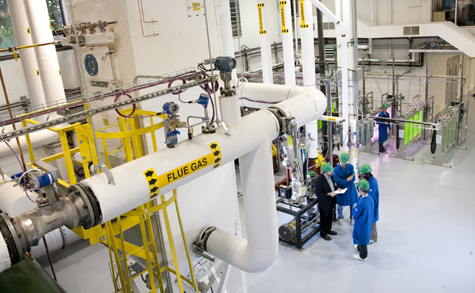
A team of engineers at the School of Engineering & Applied Science at Washington University in St. Louis has received two grants totaling more than $1.3 million to develop innovative ways to cleanly burn coal for energy.One of the grants, a one-year, $836,000 grant from the U.S. Department of Energy, funds a project that will evaluate the technical feasibility and improved economics of a unique pressurized system, which uses a staged combustion approach.

By staging the combustion, the temperature and heat transfer can be controlled, says Richard Axelbaum, PhD, principal investigator of the project. The potential benefits of the process are higher efficiency, reduced oxygen demands, reduced capital and operating costs and increased carbon dioxide purity.The grant was part of a $7 million investment by the Department of Energy into projects that advance innovative clean coal technologies. The grants focus on projects that support the development and deployment of Carbon Capture, Utilization and Storage (CCUS) by focusing on further improving the efficiency and reducing the costs associated with carbon capture.
Overall, the awards are part of a more than $5 billion investment strategy by the Obama administration in clean coal technologies and research and development.
Coal generates more than 40 percent of the electricity in the United States and 41 percent worldwide.
Axelbaum, also the Stifel & Quinette Jens Professor of Environmental Engineering Science, directs the Consortium for Clean Coal Utilization (CCCU) and heads the Laboratory for Advanced Combustion and Energy Research, where he studies combustion of fossil and renewable fuels.
“We’re taking an old fuel and applying a new technology,” Axelbaum says. “We propose to burn the coal in stages with pure oxygen and under pressure. While the use of oxygen increases costs, it can be used to prevent emissions from entering the atmosphere. There are other approaches to oxy-combustion for carbon capture and storage, but they are expensive. Our staged, pressurized combustion approach is designed to make it affordable.”
Seed funding for this project came from the CCCU, a center for research in advanced coal and carbon capture technologies. The consortium’s goal is to foster the use of coal as a safe and affordable source of energy, and as a chemical feedstock, with minimal impact on the environment.
The consortium operates under the umbrella of I-CARES, and the establishment was made possible through financial commitments from Arch Coal, Peabody Energy and Ameren. Funding goes to support a variety of research projects, advanced research facilities in the engineering school and outreach activities relating to the clean utilization of coal.
Axelbaum and his colleagues are performing the research in collaboration with members of the Electric Power Research Institute and in consultation with Burns & McDonnell.
The second grant of nearly $500,000 comes from the State of Wyoming’s Advanced Conversion Technology Research Program, which was created to stimulate research and development in the area of low-emissions and advanced coal technologies. This three-year funding also will support staged oxy-combustion research, specifically atmospheric pressure experiments using Powder River Basin coal at the university’s Advanced Coal and Energy Research Facility (ACERF).
For more information, visit cccu.wustl.edu.
Established in December 2008, the CCCU is a center for research in advanced coal and carbon capture technologies. The consortium’s goal is to foster the utilization of coal as a safe and affordable source of energy, and as a chemical feedstock, with minimal impact on the environment. The consortium operates under the umbrella of I-CARES, and the establishment was made possible through financial commitments from the lead sponsors: Arch Coal, Peabody Energy and Ameren. Funding goes to support a variety of research projects, advanced research facilities in the engineering school and outreach activities relating to the clean utilization of coal.